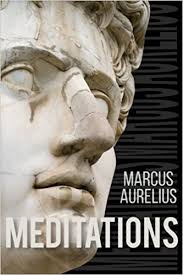Meditations Page #2
Meditations is a series of personal writings by Marcus Aurelius, Roman Emperor from 161 to 180 AD, recording his private notes to himself and ideas on Stoic philosophy. Marcus Aurelius wrote the 12 books of the Meditations in Koine Greek as a source for his own guidance and self-improvement.
Genre: Non-Fiction
Genre: Non-Fiction
- Year:
- 161
- 937 Views
On this journey his wife, Faustina, died. At his return the emperor celebrated a triumph (176). Immediately afterwards he repaired to Germany, and took up once more the burden of war. His operations were followed by complete success; but the troubles of late years had been too much for his constitution, at no time robust, and on March 17, 180, he died in Pannonia. The good emperor was not spared domestic troubles. Faustina had borne him several children, of whom he was passionately fond. Their innocent faces may still be seen in many a sculpture gallery, recalling with odd effect the dreamy countenance of their father. But they died one by one, and when Marcus came to his own end only one of his sons still lived--the weak and worthless Commodus. On his father's death Commodus, who succeeded him, undid the work of many campaigns by a hasty and unwise peace; and his reign of twelve years proved him to be a ferocious and bloodthirsty tyrant. Scandal has made free with the name of Faustina herself, who is accused not only of unfaithfulness, but of intriguing with Cassius and egging him on to his fatal rebellion, it must be admitted that these charges rest on no sure evidence; and the emperor, at all events, loved her dearly, nor ever felt the slightest qualm of suspicion. As a soldier we have seen that Marcus was both capable and successful; as an administrator he was prudent and conscientious. Although steeped in the teachings of philosophy, he did not attempt to remodel the world on any preconceived plan. He trod the path beaten by his predecessors, seeking only to do his duty as well as he could, and to keep out corruption. He did some unwise things, it is true. To create a compeer in empire, as he did with Verus, was a dangerous innovation which could only succeed if one of the two effaced himself; and under Diocletian this very precedent caused the Roman Empire to split into halves. He erred in his civil administration by too much centralising. But the strong point of his reign was the administration of justice. Marcus sought by-laws to protect the weak, to make the lot of the slaves less hard, to stand in place of father to the fatherless. Charitable foundations were endowed for rearing and educating poor children. The provinces were protected against oppression, and public help was given to cities or districts which might be visited by calamity. The great blot on his name, and one hard indeed to explain, is his treatment of the Christians. In his reign Justin at Rome became a martyr to his faith, and Polycarp at Smyrna, and we know of many outbreaks of fanaticism in the provinces which caused the death of the faithful. It is no excuse to plead that he knew nothing about the atrocities done in his name: it was his duty to know, and if he did not he would have been the first to confess that he had failed in his duty. But from his own tone in speaking of the Christians it is clear he knew them only from calumny; and we hear of no measures taken even to secure that they should have a fair hearing. In this respect Trajan was better than he.
Translation
Translate and read this book in other languages:
Select another language:
- - Select -
- 简体中文 (Chinese - Simplified)
- 繁體中文 (Chinese - Traditional)
- Español (Spanish)
- Esperanto (Esperanto)
- 日本語 (Japanese)
- Português (Portuguese)
- Deutsch (German)
- العربية (Arabic)
- Français (French)
- Русский (Russian)
- ಕನ್ನಡ (Kannada)
- 한국어 (Korean)
- עברית (Hebrew)
- Gaeilge (Irish)
- Українська (Ukrainian)
- اردو (Urdu)
- Magyar (Hungarian)
- मानक हिन्दी (Hindi)
- Indonesia (Indonesian)
- Italiano (Italian)
- தமிழ் (Tamil)
- Türkçe (Turkish)
- తెలుగు (Telugu)
- ภาษาไทย (Thai)
- Tiếng Việt (Vietnamese)
- Čeština (Czech)
- Polski (Polish)
- Bahasa Indonesia (Indonesian)
- Românește (Romanian)
- Nederlands (Dutch)
- Ελληνικά (Greek)
- Latinum (Latin)
- Svenska (Swedish)
- Dansk (Danish)
- Suomi (Finnish)
- فارسی (Persian)
- ייִדיש (Yiddish)
- հայերեն (Armenian)
- Norsk (Norwegian)
- English (English)
Citation
Use the citation below to add this book to your bibliography:
Style:MLAChicagoAPA
"Meditations Books." Literature.com. STANDS4 LLC, 2024. Web. 23 Apr. 2024. <https://www.literature.com/book/meditations_76>.




Discuss this Meditations book with the community:
Report Comment
We're doing our best to make sure our content is useful, accurate and safe.
If by any chance you spot an inappropriate comment while navigating through our website please use this form to let us know, and we'll take care of it shortly.
Attachment
You need to be logged in to favorite.
Log In